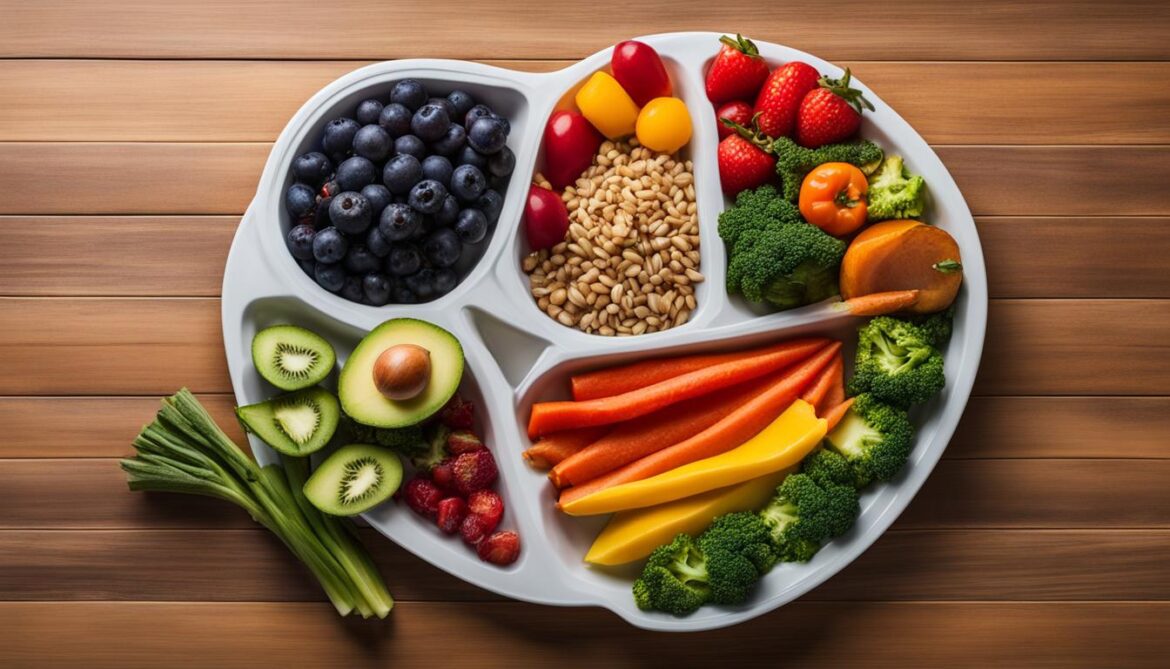When it comes to achieving weight loss and muscle gain goals, meal planning plays a crucial role. I have discovered that strategic meal planning allows individuals to create a caloric deficit for weight loss while ensuring they get the necessary nutrients to support muscle growth.
Meal planning is not only about counting calories but also about making informed choices that support both weight loss and muscle gain. By incorporating a variety of nutrient-dense foods into a well-designed meal plan, individuals can fuel their bodies for workouts, aid in muscle recovery, and achieve their desired physique.
In this article, I will explore the benefits of meal planning for weight loss and muscle gain and provide practical tips for creating a balanced meal plan that aligns with your goals. Whether you are aiming to shed those extra pounds or build lean muscle mass, meal planning can be your secret weapon to success.
Key Takeaways
- Meal planning is essential for achieving weight loss and muscle gain goals.
- By strategically planning meals, individuals can create a caloric deficit for weight loss while ensuring they receive the necessary nutrients for muscle growth.
- Weightlifting is an effective way to promote weight loss, enhance body composition, and support long-term weight management.
- Nutrition plays a vital role in achieving both weight loss and muscle gain goals, requiring a balanced diet with a moderate calorie intake and increased protein intake.
- Using meal planning as a strategy allows individuals to control portion sizes, make healthier food choices, and avoid impulsive, unhealthy eating.
Benefits of Weightlifting for Weight Loss and Muscle Gain
Weightlifting is an excellent form of exercise for individuals aiming to achieve weight loss and muscle gain. It offers a multitude of benefits that go beyond just physical appearance.
Boosts Metabolism
Weightlifting plays a crucial role in boosting metabolism, which can aid in weight loss. Unlike other forms of exercise that primarily burn calories during the activity, weightlifting increases the metabolic rate even at rest. This means that your body continues to burn calories long after you’ve finished your workout, making weightlifting an effective tool for achieving weight loss goals.
Promotes Fat Loss and Lean Muscle Gain
Weightlifting not only helps in shedding excess fat but also promotes the growth of lean muscle. This contributes to an improved body composition, giving you a more toned and defined appearance. By engaging in regular weightlifting workouts, you can effectively decrease your body fat percentage while simultaneously building strength and muscle mass.
Improves Hormonal Balance
Weightlifting has been shown to have a positive impact on hormonal balance. It stimulates the release of hormones such as testosterone and growth hormone, which are essential for muscle growth and repair. Optimizing hormonal balance through weightlifting can enhance muscle gains and accelerate the fat-burning process.
Increases Strength and Endurance
Regular weightlifting sessions lead to increased strength and endurance. By progressively challenging yourself with heavier weights and more repetitions, you gradually build up your muscular strength and endurance over time. This not only improves your performance in the gym but also enhances your overall physical abilities and functional fitness.
Supports Long-Term Weight Management
One of the remarkable benefits of weightlifting is its ability to support long-term weight management. As weightlifting helps increase muscle mass, it raises your basal metabolic rate (BMR), making it easier to maintain your desired weight. With a higher BMR, your body burns more calories throughout the day, even at rest, providing you with better weight control in the long run.
Incorporating weightlifting into your fitness routine is vital for achieving weight loss and muscle gain goals. Its diverse benefits extend beyond mere aesthetic improvements, helping you become stronger, fitter, and more resilient both physically and mentally.
So, seize the opportunity and start weightlifting today to unlock the incredible benefits it offers for weight loss and muscle gain!
| Benefits of Weightlifting | How it Helps |
|---|---|
| Boosts Metabolism | Promotes calorie burning at rest |
| Promotes Fat Loss | Builds lean muscle and improves body composition |
| Improves Hormonal Balance | Stimulates the release of testosterone and growth hormone |
| Increases Strength and Endurance | Improves muscular strength and stamina |
| Supports Long-Term Weight Management | Increases basal metabolic rate for better weight control |
The Role of Nutrition in Weight Loss and Muscle Gain
Nutrition plays a vital role in achieving both weight loss and muscle gain goals. Whether your aim is to shed those extra pounds or build lean muscle, proper nutrition is key. For successful weight loss, it is essential to create a calorie deficit. This can be achieved by consuming a balanced diet with a moderate calorie intake.
A balanced diet entails a mix of macronutrients, including carbohydrates, proteins, and healthy fats. Carbohydrates provide the energy needed for workouts, while proteins aid in muscle repair and growth. Healthy fats play a crucial role in hormone regulation and overall well-being.
Increasing protein intake is particularly vital for muscle gain. Protein is the building block of muscles and provides essential amino acids necessary for muscle repair and growth. Incorporating lean sources of protein such as chicken, fish, tofu, and legumes into your diet can help optimize muscle growth.
Meal planning is an excellent strategy for ensuring you are getting the right balance of nutrients for your weight loss and muscle gain goals. By planning your meals in advance, you can carefully select ingredients that support both objectives.
“Proper nutrition is the foundation for achieving optimal results in weight loss and muscle gain.”
| Weight Loss | Muscle Gain | |
|---|---|---|
| Caloric Intake | Calorie deficit for weight loss | Calorie surplus for muscle gain |
| Macronutrient Balance | Balance of carbs, proteins, and fats to support weight loss | Increased protein intake to support muscle growth |
| Meal Planning | Plan meals with appropriate calorie and nutrient levels | Plan meals to meet increased protein requirements |
| Meal Frequency | Regular, structured meals to support metabolism and prevent overeating | Frequent meals with ample protein to support muscle repair and growth |
Using Meal Planning for Weight Loss and Muscle Gain
Meal planning is an essential strategy for achieving both weight loss and muscle gain goals. By carefully planning and preparing meals in advance, individuals can ensure that each meal is nutritionally balanced and aligned with their specific calorie and macro goals.
One of the key benefits of meal planning is the ability to control portion sizes and make healthier food choices. With a well-designed meal plan, individuals can avoid impulsive and unhealthy eating, which often derails weight loss and muscle gain efforts.
Meal planning also provides the necessary fuel for workouts and promotes muscle recovery. By consuming the right balance of nutrients before and after exercise, individuals can optimize their performance and support muscle growth.
To illustrate the effectiveness of meal planning for weight loss and muscle gain, consider the following example:
John, a fitness enthusiast, wanted to lose weight and build lean muscle. He decided to incorporate meal planning into his routine to ensure he was eating the right foods in appropriate portions. John created a detailed meal plan that included a mix of lean proteins, complex carbohydrates, and healthy fats. He also adjusted his calorie intake to create a slight deficit for weight loss.
With his meal plan in place, John noticed significant improvements in his weight loss and muscle gain journey. He achieved steady weight loss while gradually gaining muscle mass. The structured approach of meal planning helped him stay consistent and make healthier choices, leading to long-term success.
By using meal planning as a strategic tool, individuals can take control of their nutrition and optimize their progress toward weight loss and muscle gain goals.
Ultimately, the success of meal planning lies in its ability to provide structure, promote mindful eating, and create a sustainable approach to achieving desired outcomes. Whether an individual’s goal is weight loss, muscle gain, or both, meal planning is a valuable strategy that supports overall health and well-being.
Conclusion
Meal planning is an invaluable tool for individuals looking to achieve their weight loss and muscle gain goals. By implementing a well-designed meal plan, individuals have greater control over their nutrition, ensuring they consume the right balance of calories and macronutrients. Incorporating weightlifting exercises and a balanced diet into the meal plan further enhances results and optimizes overall health.
A carefully crafted meal plan provides a sustainable approach for long-term success in weight loss and muscle gain. It allows individuals to make mindful food choices, control portion sizes, and avoid impulsive, unhealthy eating habits. Additionally, meal planning ensures the body receives the necessary fuel for workouts, aids in muscle recovery, and supports weight loss efforts.
By committing to meal planning, individuals can take charge of their journey towards a healthier and fitter lifestyle. Start meal planning today and unlock the benefits of a well-structured nutrition plan. Whether your goal is weight loss or muscle gain, a properly designed meal plan will set you on the path to achieving your desired results and maintaining a balanced and sustainable approach to your fitness journey.
FAQ
Why is meal planning important for weight loss and muscle gain?
Meal planning allows individuals to create a caloric deficit for weight loss while ensuring the proper intake of nutrients for muscle growth.
What are the benefits of weightlifting for weight loss and muscle gain?
Weightlifting boosts metabolism, promotes fat loss, improves hormonal balance, and enhances overall body composition.
How does nutrition play a role in weight loss and muscle gain?
Nutrition is crucial for weight loss as it requires a caloric deficit, and for muscle gain, increasing protein intake is essential for muscle repair and growth.
What is meal planning and how does it help with weight loss and muscle gain?
Meal planning involves planning and preparing meals in advance to ensure they are nutritionally balanced, aligned with calorie and macro goals, control portion sizes, and avoid unhealthy eating habits.
How can meal planning contribute to sustainable weight loss and muscle gain?
By incorporating weightlifting and a balanced diet into a well-designed meal plan, individuals can optimize their results, fuel workouts, aid muscle recovery, and achieve long-term success.
Source Links
- https://www.jpost.com/brandblend/article-781152
- https://aestheticclosets.com/web-stories/does-weightlifting-help-women-lose-weight-8-benefits/
- https://pune.news/updates/spice-up-your-life-5-flavorsome-allies-to-curb-sugar-cravings-114692/


